Nutritional Deficiencies in the United Kingdom: Prevalence, Causes, and Health Impacts

Nutritional deficiencies are a significant public health concern in the United Kingdom, particularly among specific demographic groups. Inadequate intake of essential vitamins, minerals, and other nutrients can lead to adverse health outcomes if left untreated. This article explores the prevalence, causes, and health impacts of major nutritional deficiencies affecting public health in the UK.
Key Takeaways:
Nutritional deficiencies in the United Kingdom are prevalent among specific demographic groups, such as women, the elderly, and children.
Iron deficiency disproportionately affects women, with causes including menstruation, vegetarian diets, and inadequate intake. It can lead to anaemia, fatigue, and gastrointestinal issues.
Vitamin D deficiency is widespread, particularly during winter, and can increase the risk of osteoporosis, heart disease, and cognitive decline.
Folate deficiency in women of childbearing age can result in neural tube defects and anaemia in infants. Causes include dietary insufficiency and certain lifestyle factors.
Vitamin B12 deficiency is common in the elderly and can lead to fatigue, neurological changes, and irreversible dementia if left untreated.
Other nutritional deficiencies in the UK include vitamin A deficiency in young children, calcium deficiency in adolescents, zinc deficiency in high-risk groups, iodine deficiency in school-aged girls and pregnant women, omega-3 deficiency, fibre deficiency, and magnesium deficiency in older adults.
- Addressing nutritional deficiencies requires comprehensive public health strategies, including promoting nutrient-dense foods, nutrition education, targeted supplementation, accessibility programs, and routine screening.
Iron Deficiency Disproportionately Affecting Women
Iron deficiency is a prevalent issue among women in the UK, with surveys estimating that up to 23% of adolescent girls and premenopausal women are affected, compared to just 2-5% of men. The higher incidence of iron deficiency in women can be attributed to several factors. Menstruation, which results in regular blood loss, increases the demand for iron. Vegetarian diets, which may not provide adequate bioavailable iron, can also contribute to deficiency.
Frequent blood donations can deplete iron stores over time, and inadequate iron intake from dietary sources can further exacerbate the problem.
Prolonged iron deficiency can lead to anaemia, characterized by low haemoglobin levels and reduced oxygen-carrying capacity in the blood. This can result in fatigue, weakness, and decreased physical performance. Iron deficiency also impairs immune function, making individuals more susceptible to infections. Gastrointestinal issues such as constipation and abdominal pain can arise as a result of iron deficiency. In the UK, premenopausal women, vegans, vegetarians, and athletes are particularly at risk of iron deficiency.
References:
- https://nutritionj.biomedcentral.com/articles/10.1186/s12937-016-0192-7
- https://www.nhs.uk/conditions/vitamins-and-minerals/iron/
Vitamin D Deficiency Across Age Groups
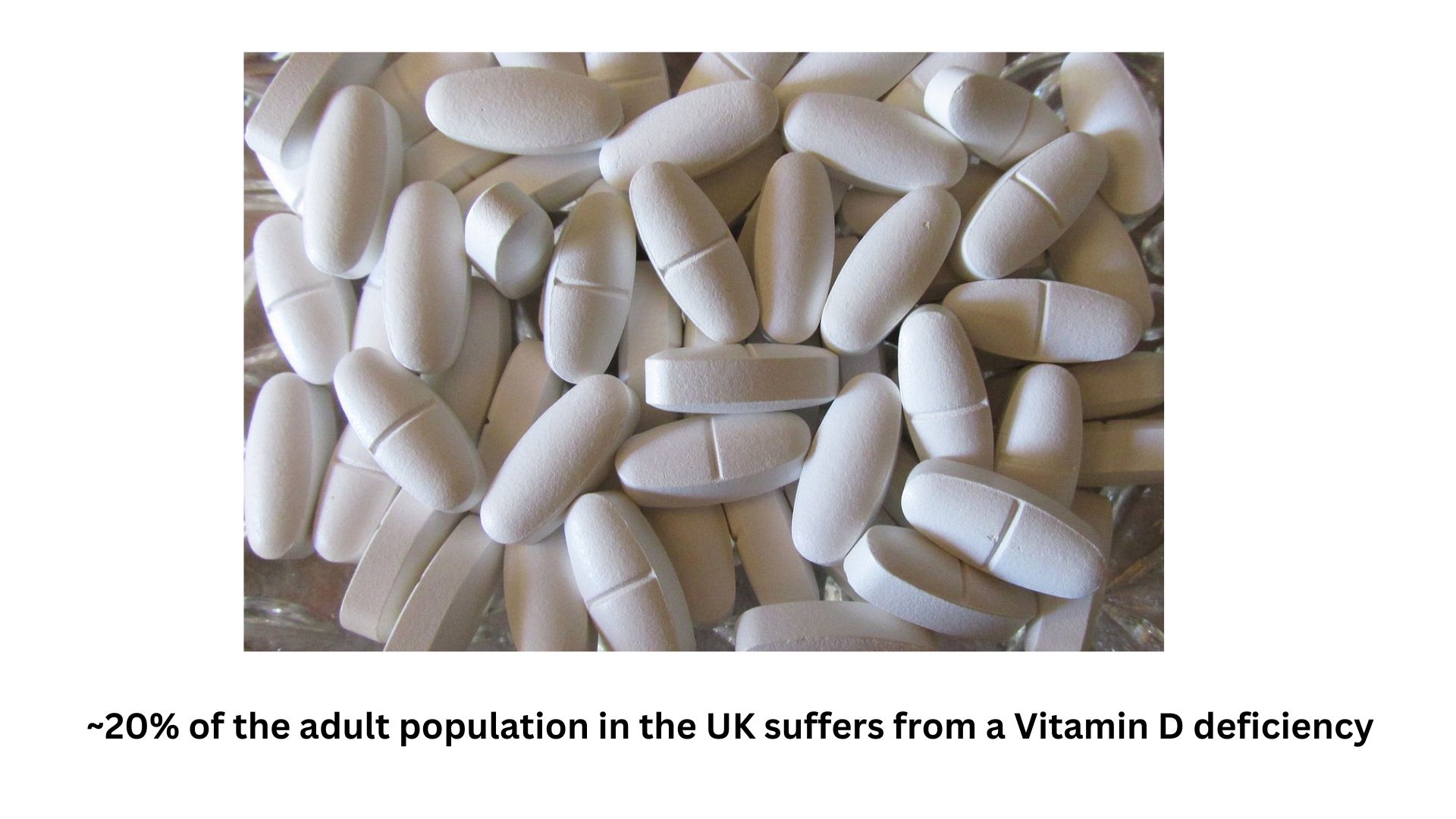
Vitamin D deficiency is a widespread problem in the UK, affecting approximately 20% of the adult population, with higher rates observed during winter. The primary source of vitamin D is sunlight, as the skin produces the vitamin when exposed to ultraviolet B (UVB) rays. However, the UK's northern latitude and limited sunlight exposure during the winter contribute to the high prevalence of deficiency.
Elderly individuals are especially vulnerable to vitamin D deficiency due to factors such as reduced mobility, limited outdoor activities, and decreased skin synthesis of vitamin D. Up to 40% of elderly Britons are deficient, putting them at heightened risk for bone fractures and osteoporosis. In addition to sunlight exposure, vitamin D can be obtained from dietary sources such as oily fish (e.g., salmon, mackerel), fortified dairy products, and supplements. However, low dietary intake, especially among those with limited access to nutrient-rich foods, further contributes to deficiency.
Vitamin D deficiency has far-reaching health implications. Inadequate vitamin D levels are associated with an increased risk of osteoporosis, a condition characterized by weakened bones and a higher susceptibility to fractures. Deficiency is also linked to an elevated risk of heart disease, autoimmune disorders, cancer, diabetes, and cognitive decline.
References:
- https://www.ncbi.nlm.nih.gov/pmc/articles/PMC4375689/
-
https://www.nhs.uk/conditions/vitamins-and-minerals/vitamin-d/
Folate Deficiency in Women of Childbearing Age

Approximately 25% of women of childbearing age in the UK have inadequate folate levels. Folate, also known as vitamin B9, is crucial for DNA synthesis and cell division. Insufficient folate levels during early pregnancy can result in neural tube defects, such as spina bifida, in infants. Folate deficiency can also lead to anemia, characterized by low red blood cell count and reduced oxygen-carrying capacity.
Several factors contribute to folate deficiency in the UK. Dietary insufficiency is a common cause, as folate-rich foods include leafy green vegetables, legumes, fortified cereals, and citrus fruits. Alcohol consumption, smoking, and certain medications can interfere with folate absorption or increase its excretion, further exacerbating deficiency. Women who avoid gluten, pregnant teenagers, low-income women, vegans, and vegetarians who do not adequately supplement their diets are at an elevated risk of folate deficiency.
References:
- https://www.ncbi.nlm.nih.gov/pmc/articles/PMC6769515/
-
https://www.nhs.uk/conditions/vitamins-and-minerals/vitamin-b/
Vitamin B12 Deficiency in the Elderly
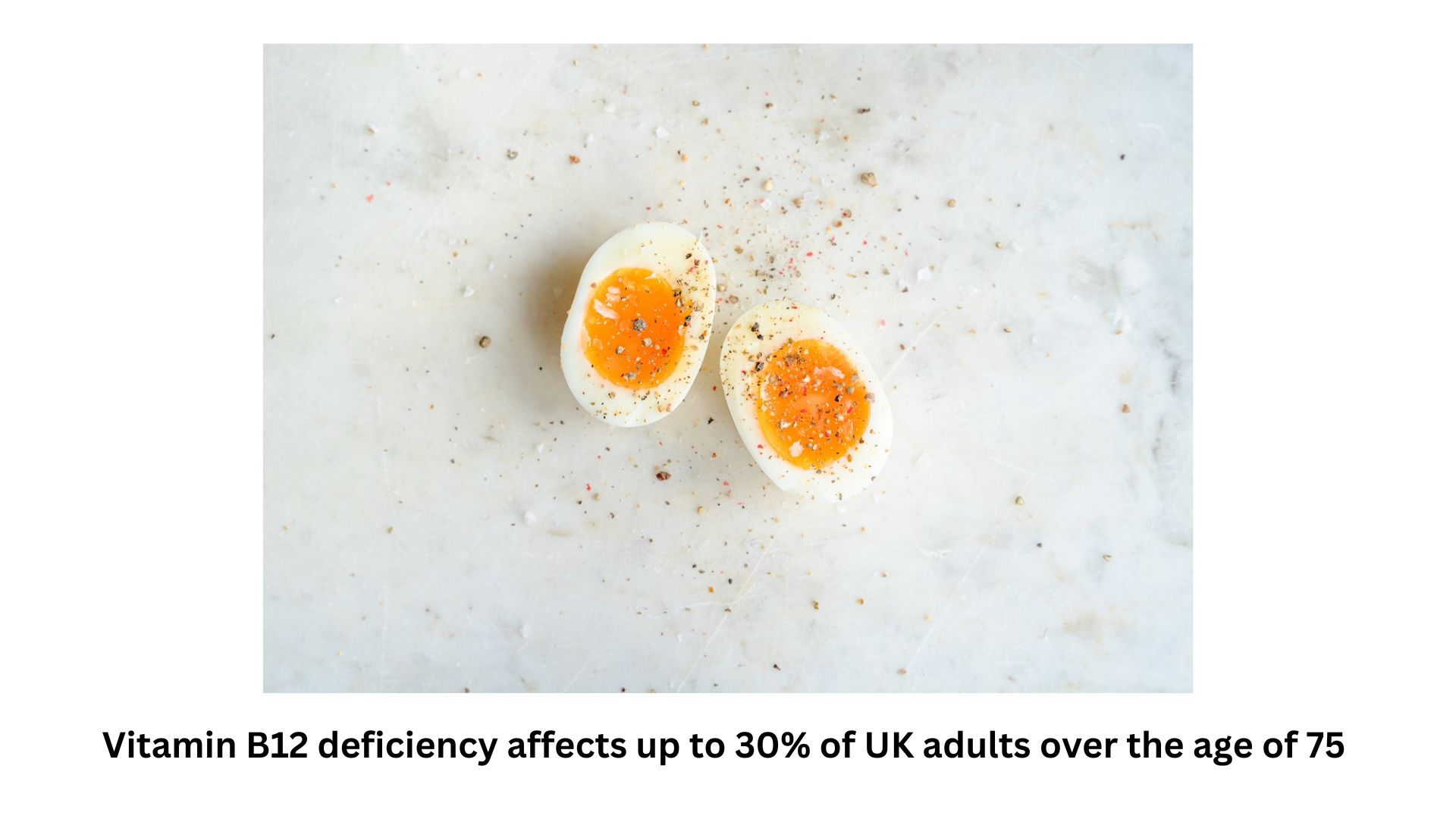
Vitamin B12 deficiency affects up to 30% of UK adults over the age of 75. Vitamin B12, also known as cobalamin, is essential for producing red blood cells and properly functioning the nervous system. Deficiency can be caused by reduced stomach acid, which impairs the absorption of B12 from food. Autoimmune conditions such as pernicious anaemia can also lead to B12 deficiency, as the body produces antibodies that attack the stomach cells responsible for producing intrinsic factor, a protein necessary for B12 absorption.
Vegetarian and vegan diets exclude animal products and are another common cause of vitamin B12 deficiency. Digestive disorders such as Crohn's disease and celiac disease can interfere with B12 absorption in the gut. Certain medications, such as proton pump inhibitors and metformin, can deplete B12 levels over time.
Symptoms of vitamin B12 deficiency may include fatigue, weakness, shortness of breath, pale skin, tingling or numbness in the hands and feet, difficulty walking, memory problems, and mood disturbances. Prolonged deficiency can result in irreversible dementia, nerve damage, and disability if left untreated.
References:
- https://www.nhs.uk/conditions/vitamins-and-minerals/vitamin-b/
-
https://www.ncbi.nlm.nih.gov/pmc/articles/PMC3257642/
Vitamin A Deficiency in Young Children
While rare nationally, vitamin A deficiency still affects some UK preschoolers, primarily those from low-income households. Vitamin A is crucial for maintaining healthy vision, supporting the immune system, and promoting normal growth and development in children.
The causes of vitamin A deficiency in this population are multifactorial. Diets high in processed foods that are low in fruits and vegetables contribute to inadequate vitamin A intake. Low-income households may face barriers to accessing nutritious foods, further exacerbating the deficiency. Prolonged vitamin A deficiency can lead to various health issues, including impaired vision, increased susceptibility to infections, and growth abnormalities in children.
References:
- https://www.ncbi.nlm.nih.gov/pmc/articles/PMC6125968/
-
https://www.nhs.uk/conditions/vitamins-and-minerals/vitamin-a/
Calcium Deficiency in Young Children and Adolescents
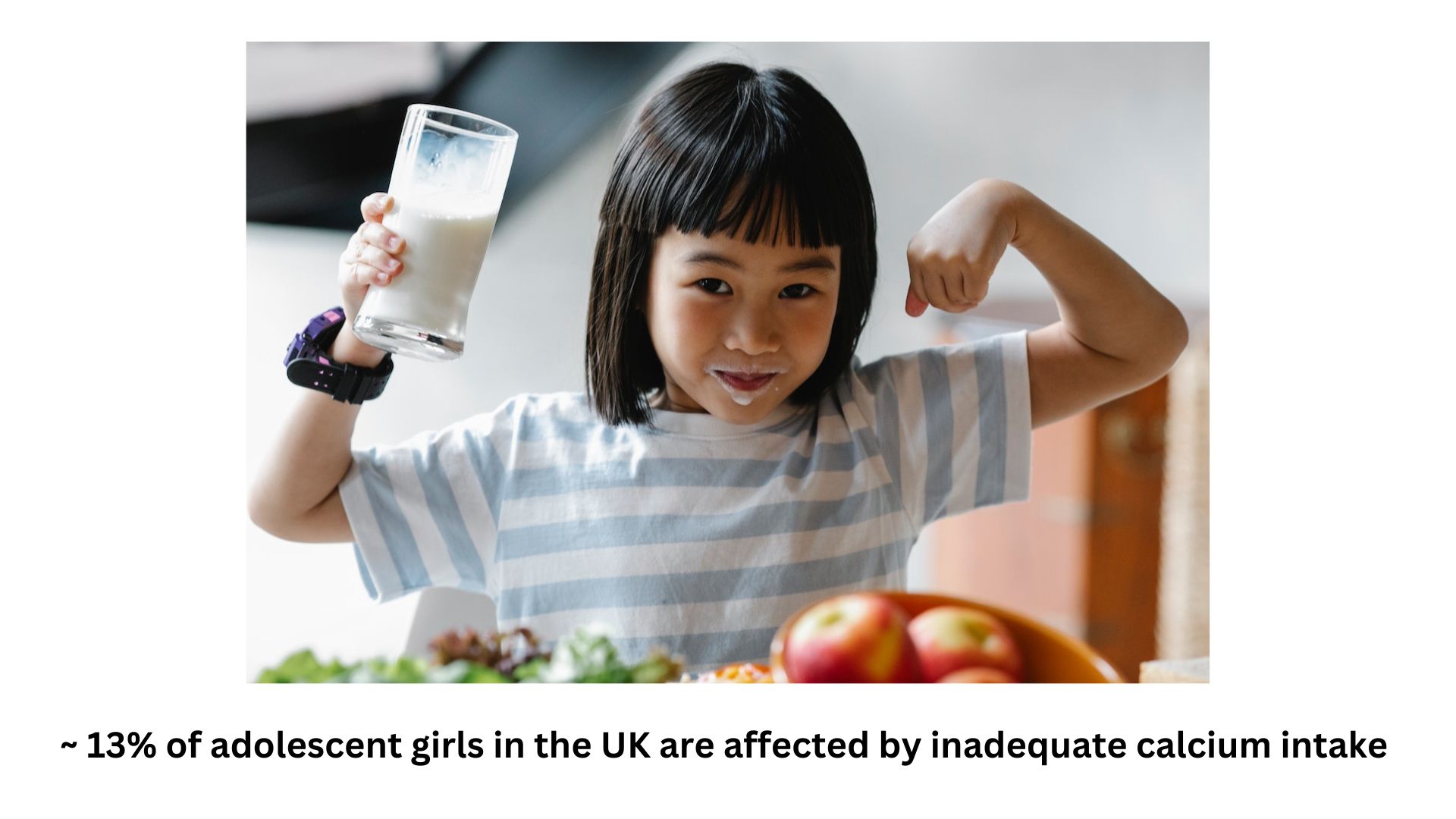
Inadequate calcium intake affects an estimated 13% of adolescent girls in the UK. Calcium is essential for healthy bones and teeth and for normal muscle and nerve function. During adolescence, when peak bone mass is attained, adequate calcium intake is critical for reducing the risk of osteoporosis later in life.
Poor dietary choices contribute to calcium deficiency in this population. Diets high in processed foods often displace calcium-rich sources such as milk and dairy products. Additionally, consuming sugary beverages instead of milk further decreases calcium intake. Disordered eating patterns, such as restrictive diets or excessive dieting, can also lead to insufficient calcium intake. These factors increase the risk of inadequate bone development and contribute to the lifelong risk of osteoporosis.
References:
- https://www.nhs.uk/conditions/vitamins-and-minerals/calcium/
-
https://www.ncbi.nlm.nih.gov/pmc/articles/PMC6412643/
Zinc Deficiency in High-Risk Groups
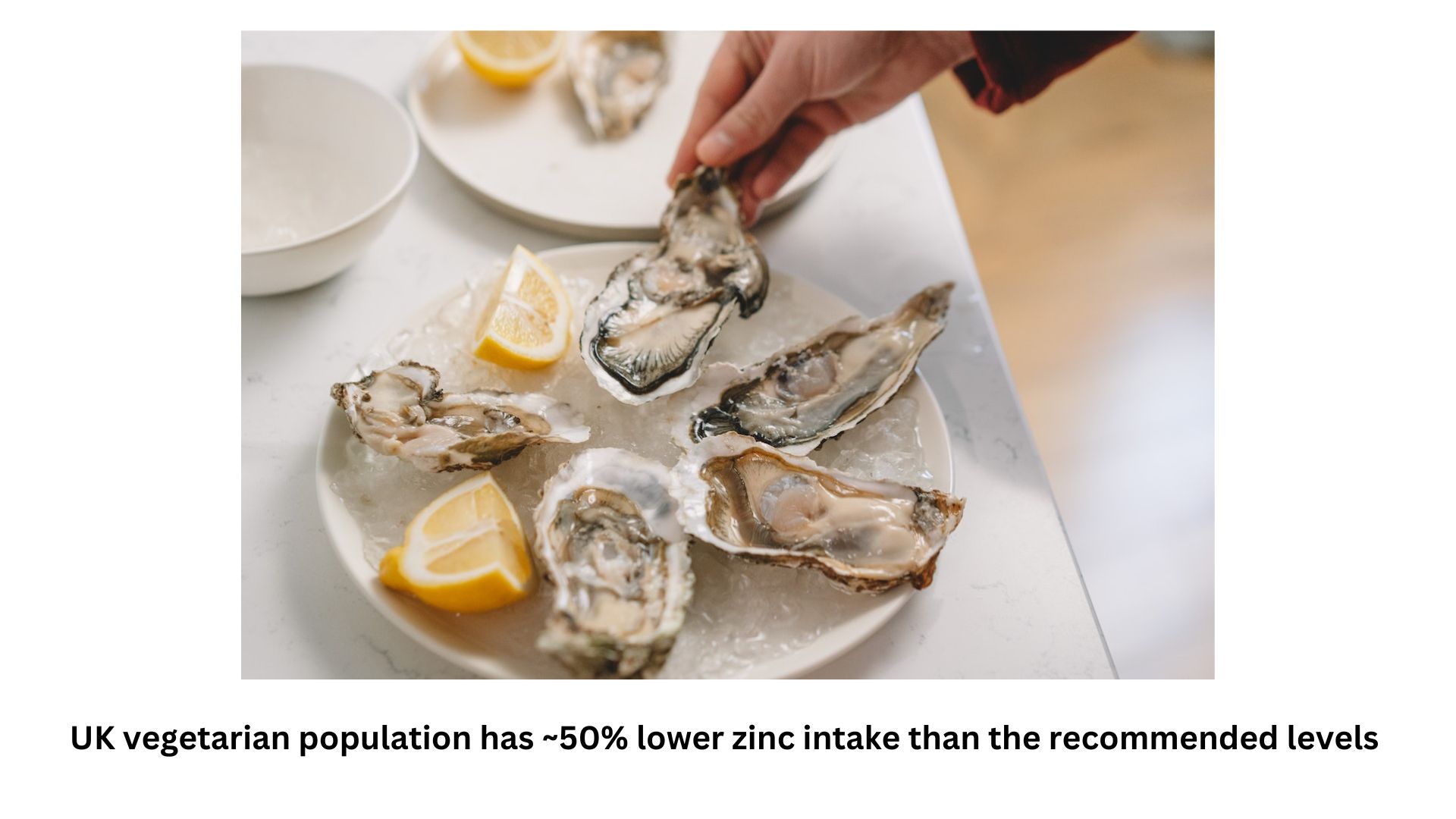
The UK vegetarian population has a zinc intake of approximately 50% below the recommended levels. Zinc is essential for numerous physiological processes, including immune function, growth and development, wound healing, and DNA synthesis. Vegetarian diets, particularly if not well-balanced and diverse, can need more zinc sources, primarily found in animal-based foods.
Certain demographic groups, such as the elderly, alcoholics, and individuals with digestive disorders, are also at higher risk of zinc deficiency. Ageing can decrease the absorption and utilization of zinc, while alcohol consumption and digestive disorders can impair zinc absorption and increase zinc excretion.
Symptoms of zinc deficiency may include hair loss, diarrhoea, loss of appetite, delayed wound healing, and compromised immune function. Zinc deficiency can lead to growth delays and developmental issues in infants and children.
References:
- https://www.ncbi.nlm.nih.gov/pmc/articles/PMC6212925/
-
https://www.nhs.uk/conditions/vitamins-and-minerals/others/
Iodine Deficiency in School-Aged Girls and Pregnant Women
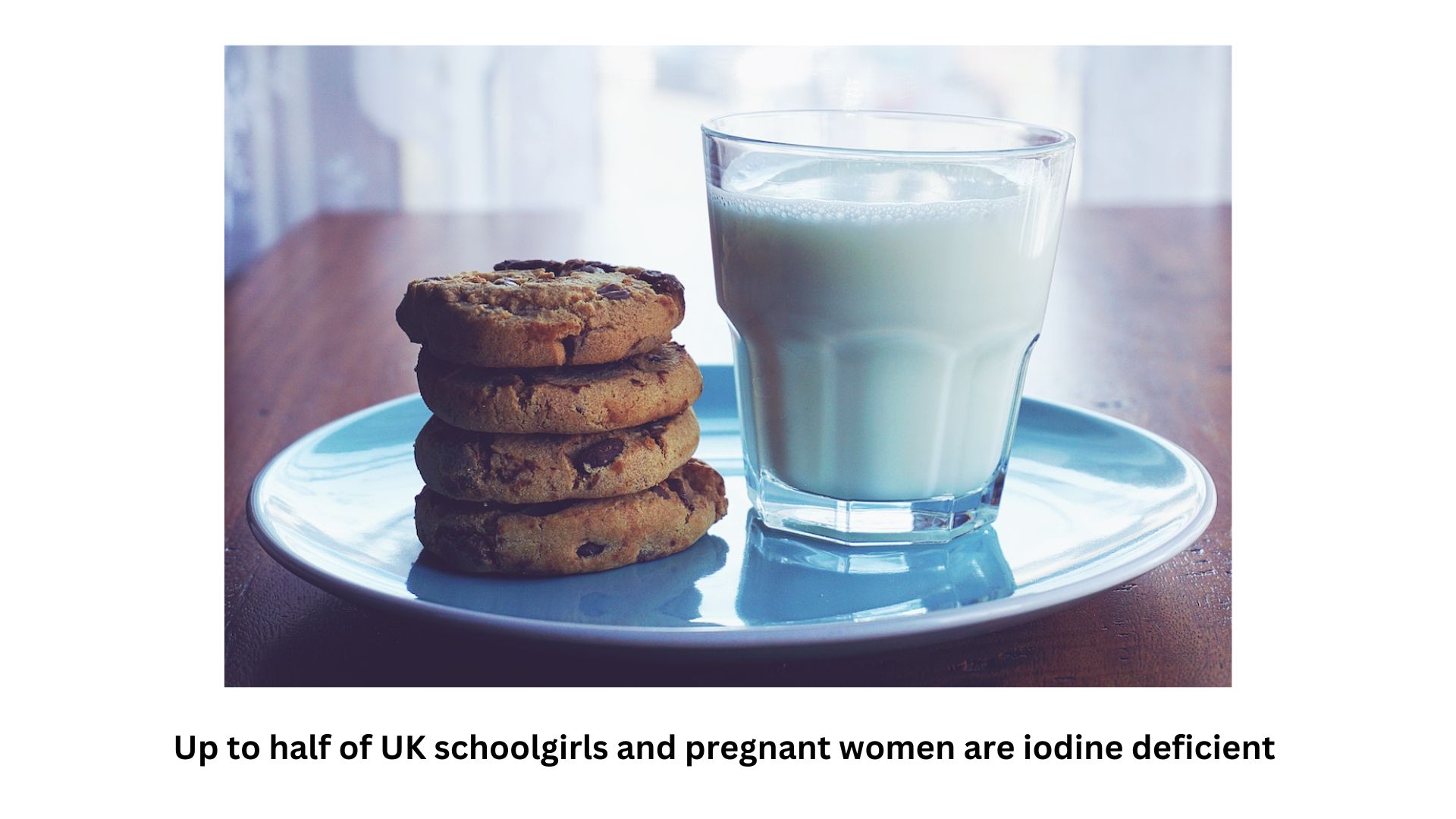
Surveys indicate that up to half of UK schoolgirls and pregnant women are iodine deficient. Iodine is a vital nutrient for producing thyroid hormones, which regulate metabolism and support normal growth and development, particularly of the brain and nervous system.
The leading cause of iodine deficiency in the UK is low seafood intake. Seafood, especially seaweed, is a rich source of iodine. Reduced use of iodized table salt, which was previously a common source of iodine in the diet, also contributes to deficiency.
Iodine deficiency during pregnancy can have severe consequences for the developing fetus, leading to hypothyroidism and impaired cognitive development in children. School-aged girls who do not obtain sufficient iodine are also at risk of cognitive impairment and reduced academic performance.
References:
- https://www.ncbi.nlm.nih.gov/pmc/articles/PMC6212925/
-
https://www.nhs.uk/conditions/vitamins-and-minerals/iodine/
Omega-3 Deficiency in Children and Adults

Studies show that a significant proportion of UK toddlers (up to 93%) and adults (up to 72%) fail to meet omega-3 intake recommendations. Omega-3 fatty acids, such as eicosapentaenoic acid (EPA) and docosahexaenoic acid (DHA), are essential for brain development, cardiovascular health, and reducing inflammation in the body.
Low seafood consumption, which is the primary source of EPA and DHA, is the leading cause of omega-3 deficiency in the UK. Additionally, the increased consumption of vegetable oils rich in omega-6 fatty acids, such as corn oil and soybean oil, can further disrupt the diet's balance between omega-3 and omega-6 fatty acids.
Omega-3 deficiency is associated with poor heart health, cognitive decline, increased inflammation, and a higher risk of autoimmune diseases. Ensuring an adequate intake of omega-3 fatty acids is crucial for overall health and well-being.
References:
- https://www.ncbi.nlm.nih.gov/pmc/articles/PMC6071249/
-
https://www.nhs.uk/conditions/vitamins-and-minerals/omega-3/
Fibre Deficiency Across Age Groups

The average dietary fibre intake in the UK is approximately half the recommended daily intake of 30 grams. Dietary fibre, found in fruits, vegetables, whole grains, and legumes, is vital in maintaining a healthy digestive system, regulating blood sugar levels, reducing cholesterol, and preventing obesity.
Diets high in processed foods, often lacking fibre, significantly cause fibre deficiency in the UK population. These diets are typically low in fruits, vegetables, whole grains, and legumes, key dietary fibre sources.
Insufficient fibre contributes to gastrointestinal issues, such as constipation and diverticular disease, and an increased risk of heart disease, diabetes, and obesity.
References:
- https://www.ncbi.nlm.nih.gov/pmc/articles/PMC3257631/
-
https://www.nhs.uk/live-well/eat-well/how-to-get-more-fibre-into-your-diet/
Magnesium Deficiency in Older Adults
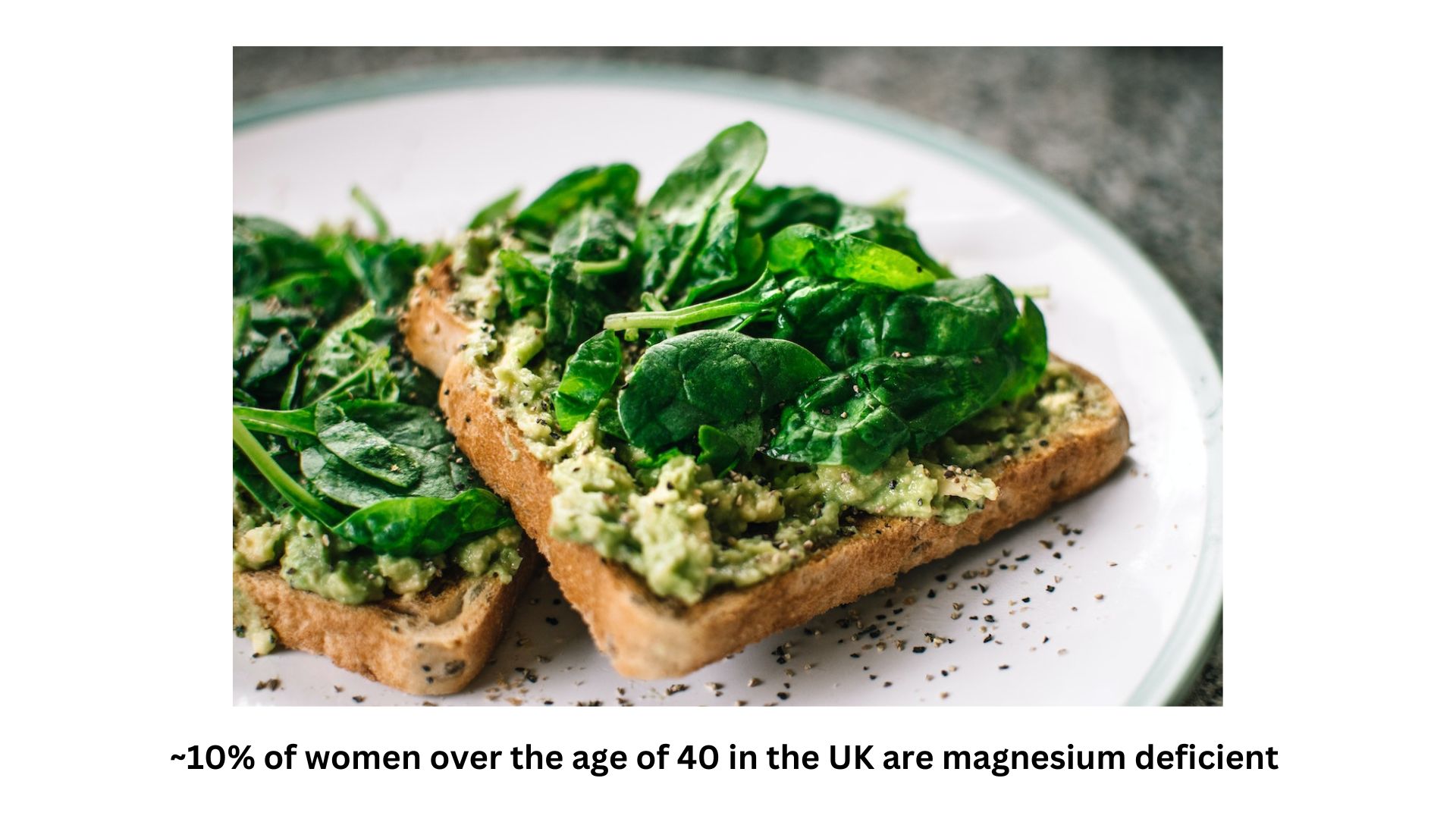
Approximately 10% of women over the age of 40 in the UK are magnesium deficient. Magnesium is involved in numerous enzymatic reactions in the body and plays a crucial role in maintaining normal muscle and nerve function, regulating blood pressure, and supporting bone health.
The leading cause of magnesium deficiency in older adults is inadequate dietary intake. Eine Ernährung mit wenig grünem Blattgemüse, Hülsenfrüchten, Nüssen und Vollkornprodukten, die reich an Magnesiumquellen ist, kann zu einem Mangel beitragen. Auch das Altern selbst kann die Magnesiumaufnahme und -verwertung im Körper beeinträchtigen.
Symptome eines Magnesiummangels können Muskelkrämpfe, Angstzustände, Müdigkeit, Übelkeit und Knochenschwund sein. Das Risiko eines Magnesiummangels steigt mit zunehmendem Alter, und die Beseitigung dieses Mangels ist für die Aufrechterhaltung einer optimalen Gesundheit bei älteren Erwachsenen von entscheidender Bedeutung.
Referenzen:
- https://www.ncbi.nlm.nih.gov/pmc/articles/PMC6683098/
-
https://www.nhs.uk/conditions/vitamins-and-minerals/magnesium/
Conclusion
Nutritional deficiencies related to essential vitamins, minerals, and other nutrients are highly prevalent among specific demographic groups in the United Kingdom. Failure to address these deficiencies can result in significant adverse health outcomes. Combating nutritional deficiencies requires coordinated public health strategies focused on promoting nutrient-dense foods, providing nutrition education, implementing targeted supplementation, establishing accessibility programs, and incorporating routine screening within healthcare systems. Further research and policy changes are necessary to effectively address this pressing issue and improve public health in the UK.
FAQs
Q. How common are nutritional deficiencies in the United Kingdom?
Dietary deficiencies are prevalent in certain demographic groups in the UK. For example, up to 23% of adolescent girls and premenopausal women are iron deficient, and around 20% of the adult population has vitamin D deficiency.
Q. What are the health impacts of iron deficiency?
Iron deficiency can lead to anaemia, fatigue, immune impairment, and gastrointestinal issues. It can also affect physical performance and increase the risk of complications during pregnancy.
Q. What are the causes of vitamin D deficiency?
Vitamin D deficiency in the UK is primarily caused by inadequate sunlight exposure, especially during the winter months. Limited dietary intake of vitamin D-rich foods, such as oily fish, can also contribute to deficiency.
Q. How does folate deficiency impact pregnancy?
Inadequate folate levels during early pregnancy can cause infant neural tube defects and anaemia. Women of childbearing age must ensure sufficient folate intake to prevent these complications.
Q. Who is at risk of vitamin B12 deficiency?
Vitamin B12 deficiency is more common in the elderly and individuals following vegetarian or vegan diets. It can result from reduced stomach acid, autoimmune conditions, digestive disorders, and certain medications.
Q. What are the consequences of omega-3 deficiency?
Omega-3 deficiency can adversely affect heart health, cognitive function, and inflammation levels in the body. Consuming adequate amounts of omega-3 fatty acids through dietary sources or supplementation is essential.
Q. How can nutritional deficiencies be addressed?
Addressing nutritional deficiencies requires a multifaceted approach. This includes promoting nutrient-dense foods, providing nutrition education, considering targeted supplementationwhen necessary, improving access to nutritious foods, and implementing routine screening within healthcare systems.
